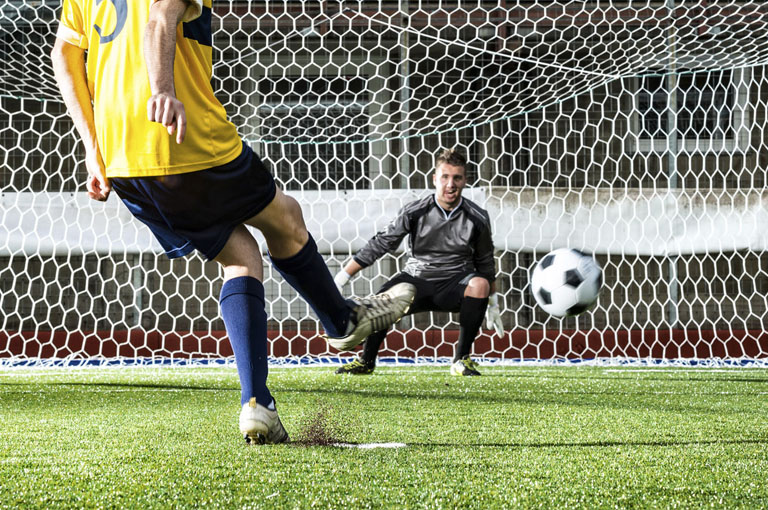How to make penalty shootouts fairer
Penalty shootouts in football could be made fairer by switching the order in which the penalties are taken, according to UM researcher Mehmet Ismail and New York University’s Professor Steven Brams. They devised a new method, the ‘Catch-Up Rule’, that reduces the element of chance and thereby mitigates the unfairness caused by the current Standard Rule in penalty shootouts.
Under the Standard Rule, a coin toss determines which team kicks first on all five penalties, giving a substantial advantage – both in theory and practice – to the team that goes first. In major tournaments between 1970 and 2013, the team that kicked first won the penalty shootout 60.6% of the time. The Catch-Up Rule reduces this bias to around 51%, making the contest essentially even. The new rule calls for the following: if both teams either score or miss in a given round, then the order is swapped in the next round. But if one team misses and the other scores, the team that missed gets to go first in the following round.
Psychological disadvantage
The disadvantage caused by the Standard Rule is mainly a psychological one. “When coaches and players were asked in a survey whether they would choose to go first or second if they won the coin toss, more than 90% said they would go first. When asked for the rationale behind their choice, most said they wanted to put psychological pressure on their opponent”, Ismail explains. “Clearly, there’s a strong perceived advantage of shooting first, and this also plays out in reality.”
Brams and Ismail see little reason to continue using the Standard Rule. “We believe the Catch-up Rule is practical and easy to implement. A first step might be to pilot the rule in a specific country or tournament. It’s also important to see how spectators react”, Ismail says. He himself now views football matches differently, knowing the game could be made fairer: “Recently, the Champions League final between Real Madrid and Atlético Madrid went to penalties. Real Madrid won the coin toss, chose to kick first and won 5-3. Could Atlético Madrid have benefited from the Catch-Up Rule? We’ll never know!” That said, he still enjoys watching football, and will be cheering for his home country Turkey during the European Championship.
Other sports
Several other sports, such as tennis, volleyball and badminton, could also benefit from certain rule changes. “The rules of many sports are not fair”, the researchers say. “They do not ensure that equally skilled competitors have the same probability of winning.” In a forthcoming paper Brams and Ismail, together with their colleague in the field Marc Kilgour (Wilfrid Laurier University, Canada), show that while the tiebreaker used in tennis is fair, the rules in badminton benefit the player who serves first and the rules in volleyball give the edge to the team that receives first.
Game theory
To create the Catch-Up Rule, Ismail and Brams used ideas from fair division and game theory. In game theory, a game is defined by the totality of the rules that describe it. In almost all competitive sports, the rules allow for some element of chance, such as who gets to move first. Fair division deals with the fairness of these rules according to certain predetermined criteria. According to Ismail, the inspiration for the new method came from Brams’ numerous works and experience in these fields.
The paper ‘Making the rules of sports fairer’ can be downloaded here.
Mehmet Ismail is a PhD student at Maastricht University’s Department of Economics. His main research interests lie in the areas of economics and applied mathematics.
Steven Brams is Professor of Politics at the Department of Politics, New York University. He specialises in research on game theory, fair division, voting and elections, and international politics.
By: Dunja Bajic
